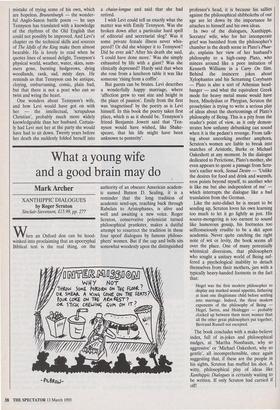What a young wife and a good brain may do
Mark Archer
XANTHIPPIC DIALOGUES by Roger Scruton Sinclair-Stevenson, £15.99, pp. 277 authority of an obscure American academ- professor's head, it is because his sallies against the philosophical shibboleths of our age are let down by the importance he attaches to himself and his own ideas.
In two of the dialogues, Xanthippe, Socrates' wife, who for her intemperate grief was banished from the philosopher's chamber in the death scene in Plato's Phae- do, explains her view of her husband's philosophy to a high-camp Plato, who minces around like a poor imitation of Kenneth Williams in a Carry On film. Behind the insincere jokes about Xylophantes and his Screaming Corybants — Plato is also a sort of Athenian head- banger — and what the equivalent Greek mode for heavy metal music would have been, Mixolydian or Phrygian, Scruton the proselytiser is trying to write a serious play of ideas about the shortcomings of Plato's philosophy of Being. This is a pity from the reader's point of view, as it only demon- strates how unfunny debunking can sound when it is the pedant's revenge. From talk- ing about uncorking another amphora, Scruton's women are liable to break into snatches of Aristotle, Burke or Michael Oakeshott at any moment. In the dialogue dedicated to Perictione, Plato's mother, she even appears to quote a passage from Scru- ton's earlier work, Sexual Desire — 'Unlike the desires for food and drink and warmth, eros points beyond myself, to another who is like me but also independent of me' which interrupts the dialogue like a bad translation from the German.
Like the auto-didact he is meant to be sending up, Scruton loves his own learning too much to let it go lightly as jest. His source-mongering is too earnest to sound like humorous gossip, his footnotes too selfconsciously erudite to be a skit upon academia. Never quite catching the right note of wit or levity, the book seems all over the place. One of many potentially whimsical diversions, that philosophers who sought a unitary world of Being suf- fered a psychological inability to detach themselves from their mothers, jars with a typically heavy-handed footnote in the fact that:
Hegel was the first modern philosopher to display any marked sexual appetite, fathering at least one illegitimate child before settling into marriage. Indeed, the three modern exponents of the philosophy of Being Hegel, Sartre, and Heidegger — probably clocked up between them more women than all the other great philosophers put together, Bertrand Russell not excepted.
The book concludes with a make-believe index, full of in-jokes and philosophical nudges, at 'Martha Nussbaum, why so aggressive' or 'Michael Oakeshott, why so gentle', all incomprehensible, once again suggesting that, if these are the people in his sights, Scruton has muffed his shot. A witty, philosophical play of ideas like Xanthippic Dialogues is certainly waiting to be written. If only Scruton had carried if off!


























































 Previous page
Previous page